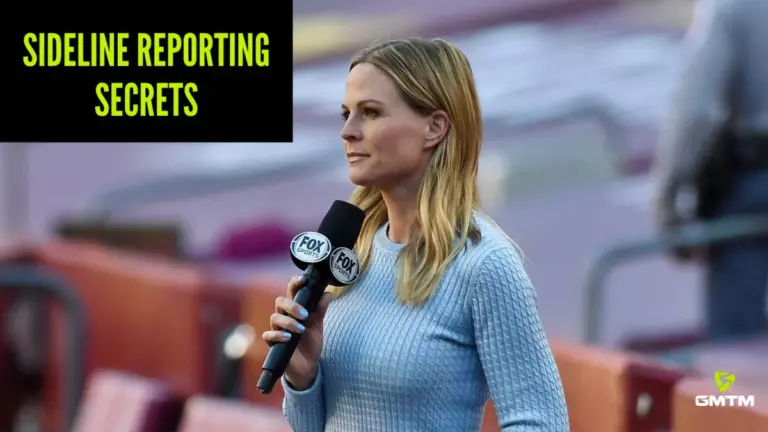Are you an aspiring sports journalist or photographer looking to cover major sporting events? One key component you’ll need is media credentials. Securing media credentials for sporting events grants you access to press boxes, locker rooms, and the field, providing you with unparalleled coverage opportunities. However, the process of obtaining these credentials can be complex and varies depending on the event and organization. In this blog, we will guide you through the intricacies of how to get media credentials for sporting events, including the necessary steps, requirements, and tips to increase your chances of approval. Let’s dive in and unlock the doors to your media access dreams!
Introduction: Understanding the Importance of Media Credentials

Media credentials are essential for gaining access to cover sporting events up close and personal. As a journalist, photographer, or media personnel, having the right credentials not only grants you entry but also signifies your legitimacy and professionalism in the industry.
Benefits of Media Credentials
Having valid media credentials can open doors to exclusive event coverage, press conferences, and one-on-one interviews with athletes and coaches. It also allows you to capture dynamic photos and videos from prime locations within the venue.
Furthermore, media credentials give you the authority to represent your media outlet, providing you with credibility and access to restricted areas that are off-limits to the general public.
Building Trust and Relationships
Media credentials are not merely passes; they symbolize trust between event organizers and the media. By obtaining these credentials, you demonstrate your commitment to ethical reporting and adhere to industry standards, fostering long-term relationships within the sporting community.
Benefits of Media Credentials for Sporting Events
Media credentials for sporting events provide a range of advantages to journalists, photographers, and media personnel. These credentials grant access to restricted areas, press boxes, and exclusive interviews, allowing media professionals to cover events comprehensively and deliver timely updates to the audience.
Enhanced Coverage
Having media credentials enables reporters to capture moments from unique vantage points, providing readers with insightful coverage that goes beyond basic match summaries or scores.
Access to players for post-game interviews allows journalists to gather exclusive quotes, insights, and reactions, enhancing the depth of their sports articles.
Networking Opportunities
Media credentials also open doors to networking opportunities with other industry professionals, fostering collaborations, and potential career advancements in the sports media sector.
- Meeting other journalists and media personalities allows for knowledge sharing and exchanging of ideas, leading to professional growth and development.
- Networking with athletes, coaches, and sports organizations can result in future partnership opportunities or exclusive content collaborations.
Steps to Obtain Media Credentials
Media credentials are essential for journalists and photographers to gain access to sporting events. Here are the steps to obtain media credentials for sporting events in the current year:
Research Events and Organizers
Begin by researching the specific sporting events you wish to cover and identify the organizing bodies. Check their official websites for media credential application procedures and deadlines.
Additionally, reach out to the media relations or press contacts to inquire about the credentialing process.
Prepare Necessary Documentation
Compile essential documents such as press credentials, assignment letters from your media outlet, photo identification, and previous work samples.
Ensure all documentation meets the event’s requirements to increase your chances of approval.
Submit Application Form
Complete the media credential application form provided by the event organizers. Include all required information and submit it within the specified deadline.
Double-check the accuracy of your details before submission to avoid any delays.
Follow Up and Confirm
After submitting your application, follow up with the organizers to confirm receipt. Address any additional requests promptly to expedite the credentialing process.
Stay proactive and maintain communication to ensure a smooth credentialing experience.
Researching Application Requirements
When aiming to secure media credentials for sporting events, the initial step involves meticulous research on the specific requirements set by the event organizers and relevant authorities.
Event Specifics
Begin by visiting the official website of the sporting event to gather information on the credentialing process, deadlines, and necessary documentation.
Ensure to emphasize any unique criteria mentioned for media professionals.
Media Organization Verification
Contact your media organization’s accreditation office to ascertain if they have specific guidelines or forms required for media credential applications.
- Check if there are any supplementary documents that need to be submitted along with the application.
- Enquire about the verification timeline to ensure timely processing.
Preparing a Strong Application
When aiming to obtain media credentials for sporting events, a well-prepared application is crucial. To increase your chances of approval, follow these essential steps:
Gather Necessary Documentation
Ensure you have all required documents, such as press credentials, a letter of assignment, and photo identification.
Highlight your previous work in sports journalism to showcase your expertise in the field 2023.
Craft a Compelling Cover Letter
Write a personalized cover letter that explains why you are interested in covering the particular event and how your experience aligns with it.
Use action verbs and be concise yet impactful in highlighting your qualifications.
Following Up on Your Application
After submitting your application for media credentials for sporting events, it’s essential to follow up to ensure your request is being processed efficiently.
Checking Application Status
Once you’ve submitted your application, wait for a reasonable time before following up. You can reach out to the media credentials department through email or phone. Ensure to mention the event name and date.
Polite and Professional Communication
When following up, maintain a polite and professional tone in your communication. Express your enthusiasm for covering the event and inquire about the status of your application. Being courteous can significantly impact the outcome.
Tips for Successful Media Credential Applications
If you are looking to get media credentials for sporting events, follow these tips for a successful application process
Start Early
Submitting your application well in advance increases your chances of approval. Ensure you know the application deadlines for each event.
Research Requirements
Every event may have specific credentialing requirements. Make sure you understand what documents or verification you need to provide.
Provide Examples of Work
Include a portfolio of your previous works to showcase your credibility and experience in sports journalism.
Follow Up
After submitting your application, follow up with the event organizers to ensure they have received it and to inquire about the status of your request.
Utilizing Media Credentials on Event Day
On event day, having media credentials opens up various opportunities for coverage. Here’s how you can maximize their potential:
Plan Your Coverage in Advance
Before the event begins, create a coverage plan to ensure you capture all the necessary moments.
Organize your equipment and know the schedule of events to stay ahead.
Capture Exclusive Moments
With media credentials, you can access restricted areas to capture unique angles.
Don’t miss out on interview opportunities with players and coaches.
Networking and Building Relationships in the Industry
Networking and building relationships in the industry are crucial steps towards gaining media credentials for sporting events. By connecting with key individuals and organizations, you can increase your chances of securing access to these events.
Engage with Industry Professionals
Attend industry events, conferences, and workshops to meet professionals in the sports media field. Engaging in conversations and sharing insights can help you establish valuable connections.
Participate in online forums and social media groups related to sports journalism to interact with industry experts and stay updated on the latest trends.
Collaborate with Local Media Outlets
Collaborating with local media outlets or sports publications can provide you with opportunities to cover events under their umbrella, enhancing your credibility and experience.
Offer to contribute articles or reports to their platforms, showcasing your skills and dedication to sports journalism.
Frequently Asked Questions
-
- What are media credentials for sporting events?
- Media credentials are passes that grant members of the media access to cover sporting events such as games, matches, press conferences, and interviews.
-
- Why are media credentials necessary for covering sporting events?
- Media credentials are necessary to distinguish legitimate members of the media from the general public, granting them access to restricted areas and enabling them to conduct interviews, capture footage, and report on the event.
-
- How can I apply for media credentials for a sporting event?
- To apply for media credentials, you typically need to contact the event’s press office or media relations department. They will provide you with the necessary forms and requirements for applying.
-
- What information do I need to provide when applying for media credentials?
- When applying for media credentials, you may need to provide information such as your media outlet’s name, your role (e.g., photographer, journalist), proof of assignment to cover the event, and any relevant credentials or past work.
-
- How far in advance should I apply for media credentials?
- It is recommended to apply for media credentials well in advance of the sporting event, as there may be limited spots available and certain deadlines for application submissions.
Unlocking Access: How to Get Media Credentials for Sporting Events
In conclusion, obtaining media credentials for sporting events is a valuable opportunity for journalists, photographers, and content creators to cover and showcase the action up close. By following the steps outlined in this guide, such as researching event requirements, preparing a solid portfolio, and building professional relationships, individuals can increase their chances of securing credentials. Remember, persistence and professionalism are key in this competitive field. Ultimately, gaining media credentials opens doors to thrilling experiences and exclusive coverage that can elevate your career in sports journalism. So, go ahead, pursue your passion, and unlock the access you need to tell compelling stories from the heart of the action.



